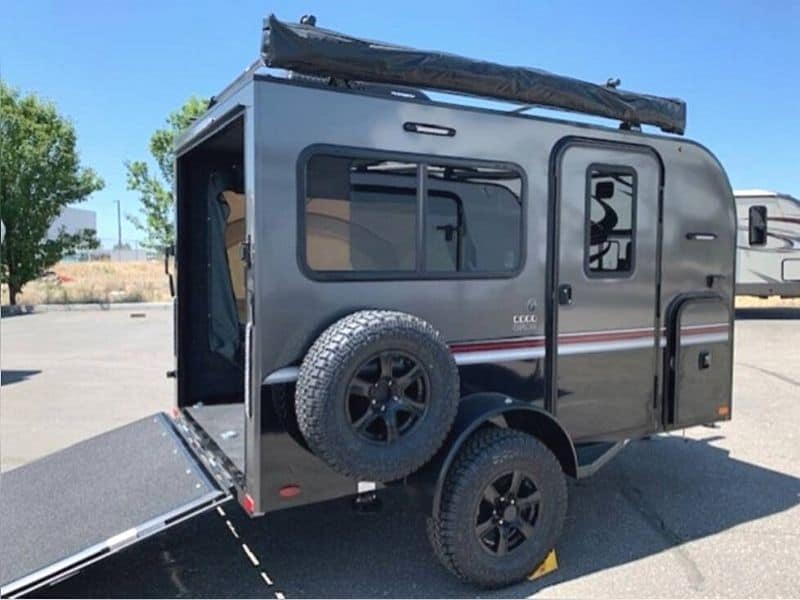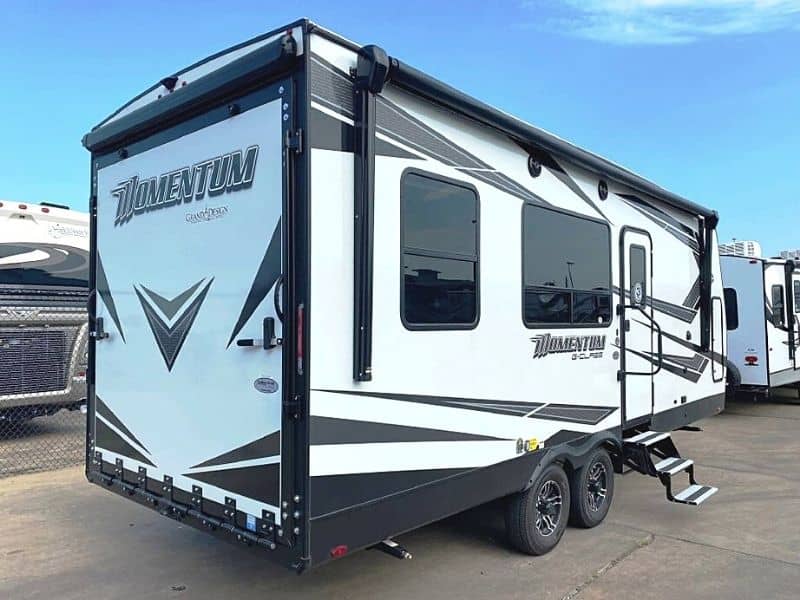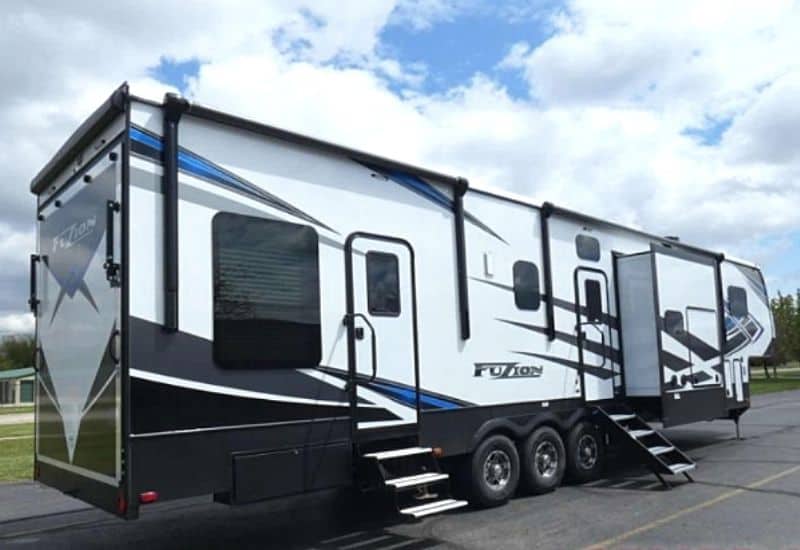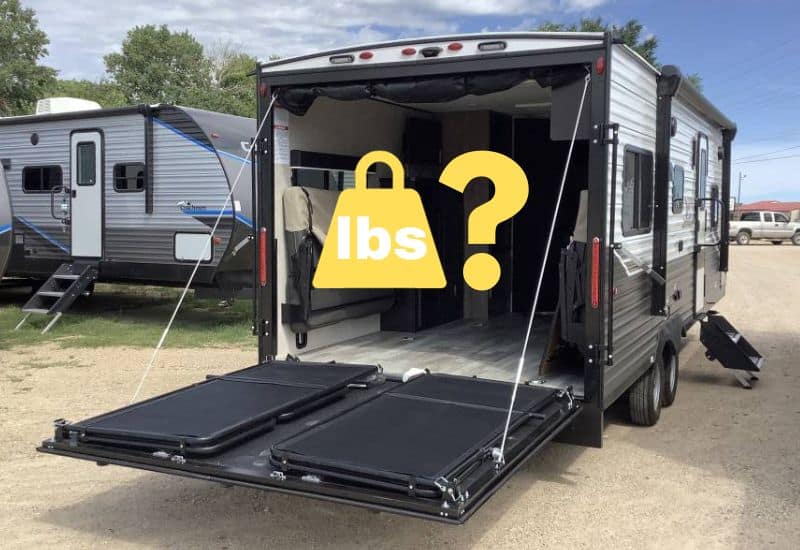Cargo carrying capacity is important for all types of RVs, as it indicates how much weight you can safely carry.
However, a class of RV where cargo-carrying capacity is especially important is the toy hauler, as they need to have higher payload capacities to handle heavier ‘toys’.
If you’re thinking about purchasing a toy hauler though, you’re probably wondering how much weight they can handle, as this will have a big impact on what types of cargo and toys you can carry.
If this sounds like you, you’re in the right place, because in this blog post, we dive into the typical weight capacity of a toy hauler with 20 specific models.
Plus, discuss the main factors that affect these capacities and how to get the most out of a toy hauler’s payload capacity.
Key Takeaways
- Toy hauler payload capacity can range from 1,500 to 6,000 pounds, depending on the model and its size.
- Small lightweight toy haulers usually carry between 1,500 and 3,000 pounds, mid-size toy haulers between 3,000 and 5,000 pounds, and large toy haulers between 4,000 and 6,000 pounds.
- Many factors affect the weight capacity of a toy hauler.
- There are many things you can do to maximize your toy hauler’s carrying capacity.
How Much Weight Can a Toy Hauler Carry?
Toy haulers typically have a higher payload capacity than any other RV class.
Like all RV classes though, cargo-carrying capacity can vary substantially based on the size and configuration of the toy hauler.
However, in general, small lightweight toy haulers usually carry between 1,500 and 3,000 pounds, mid-size toy haulers between 3,000 and 5,000 pounds, and large toy haulers between 4,000 and 6,000 pounds.
Small Toy Haulers: Compact & Capable

While not as capable as their larger counterparts in carrying capacity, small lightweight toy haulers can be a great option for those who want better maneuverability or who have a less capable tow vehicle.
These compact models are perfect for weekend adventurers who have less gear and toys to transport.
Typically lightweight toy haulers have dry weights of under 5,000 pounds, or under 6,000 pounds, with cargo carrying capacities between 1,500 and 3,000 pounds.
Which is more than enough payload capacity to carry a couple of dirt bikes or an ATV.
Small Toy Hauler Cargo-Carrying Capacity
| Make/Model/Trim | Dry Weight | Cargo-Carrying Capacity |
|---|---|---|
| inTech Flyer Explore | 1,450 lbs | 970 to 1,540 lbs |
| Forest River Wildwood FSX 181RT | 3,204 lbs | 1,636 lbs |
| KZ Sportsmen Classic 180TH | 3,340 lbs | 1,660 lbs |
| Sunset Park RV Rush 24FB | 4,240 lbs | 3,440 lbs |
| Forest River No Boundaries NB19.1 | 4,941 lbs | 2,955 lbs |
| Keystone Outback Ultra-Lite 240URS | 5,491 lbs | 2,099 lbs |
| Coachmen Adrenaline 21LT | 5,750 lbs | 3,985 lbs |
Mid-Size Toy Haulers: Balancing Size, Space, & Capacity

While compact toy haulers are great for those with less capable tow vehicles, they often lack the cargo capacity and size to carry larger, heavier toys, which is where mid-size toy haulers come in.
Mid-size toy haulers usually have dry weights of under 8,000 pounds and cargo-carrying capacities ranging from 3,000 to 5,000 pounds.
It’s not just about their higher payload capacities though, as mid-size toy haulers also usually have larger garages.
Making it easier to fit bigger toys into the camper, like a side-by-side.
Mid-Size Toy Hauler Cargo-Carrying Capacity
| Make/Model/Trim | Dry Weight | Cargo-Carrying Capacity |
|---|---|---|
| Forest River XLR Boost 27QB | 6,385 lbs | 3,600 lbs |
| Grand Design Momentum G Class 21G | 6,400 lbs | 3,595 lbs |
| Jayco Jay Flight Octane 255 | 6,665 lbs | 2,835 lbs |
| Heartland Fuel F-250 | 6,700 lbs | 4,472 lbs |
| Forest River Wolf Pack 23Pack15 | 7,296 lbs | 3,898 lbs |
| Coachmen Adrenaline 27KB | 7,488 lbs | 3,512 lbs |
| Forest River XLR Micro Boost 301LRLE | 7,938 lbs | 3,907 lbs |
Large Toy Haulers: Maximum Capacity for Big Adventures

The largest toy haulers on the market unsurprisingly also tend to have the highest cargo and payload capacities, often ranging from 4,000 to 6,000 pounds.
Making them ideal for those who have lots to haul,
Whether that’s large recreational vehicles like golf carts or UTVs or a combination of lots of different toys.
They also tend to provide luxurious living quarters, which is great for those who want to bring all their toys with them without sacrificing comfort.
Because of their larger size and heavier weight though, they also require the most heavy-duty tow vehicles, as large luxury toy haulers typically require at a minimum a 3/4-ton truck and often a 1-ton truck, to tow them safely.
Large Toy Hauler Cargo-Carrying Capacity
| Make/Model/Trim | Dry Weight | Cargo-Carrying Capacity |
|---|---|---|
| KZ RV Venom 3911TK | 14,690 lbs | 4,460 lbs |
| Dutchmen RV Voltage 4135 | 15,319 lbs | 4831 lbs |
| Grand Design Momentum 399TH | 15,900 lbs | 4,100 lbs |
| Keystone Fuzion 430 | 15,915 lbs | 4,143 lbs |
| Dutchmen RV Voltage 4225 | 16,267 lbs | 3908 lbs |
| Jayco Seismic 4113 | 16,785 lbs | 4,700 lbs |
The Impact of Toy Hauler Design on Weight Capacity
Many factors can affect the weight capacity of a toy hauler, however, we’ve listed some of the biggest impactors below.
Type and Size of the Toy Hauler
As we’ve already shown above, the size of the toy hauler can have a big impact on its ability to carry weight.
With smaller lighter models offering less payload capacity compared to larger heavier models.
It’s not just about size though, as its class can also have an impact on its carrying capacity.
For example, 5th-wheel toy haulers tend to have a greater payload capacity compared to travel trailer toy haulers.
Construction & Materials
The build quality and materials used in the construction of toy haulers can have a big impact on payload capacity.
For instance, premium toy haulers generally offer more robust construction and heavy-duty materials compared to entry-level ones.
Because of this, higher-end toy haulers generally offer higher cargo-carrying capacities compared to lower-end toy haulers.
Toy Hauler Gross Vehicle Weight Rating
Cargo-carrying capacity isn’t the only important weight associated with toy haulers, as gross vehicle weight rating or GVWR is equally as important.
This is because the toy hauler’s GVWR tells you the maximum weight the camper can safely handle, including the weight of the RV as well as everything inside it.
Because of this, toy haulers with higher GVWRs also tend to have higher payload capacities.
Dry Weight of the Toy Hauler
While premium toy haulers offer more robust construction and heavy-duty materials, this can be somewhat of a double-edged sword.
As these features also tend to make the toy hauler heavier, potentially reducing the available weight for cargo.
As the payload capacity of a toy hauler is determined by the difference between its gross vehicle weight rating and dry weight.
Therefore, a toy hauler with a lower dry weight, when compared to another camper with the same GVWR, will be able to offer a higher cargo-carrying capacity.
Axle Rating
A toy hauler is only as strong as its foundation, and just like every other RV on the road, this starts with the camper’s axle, which has a direct correlation with its cargo-carrying capacity.
As toy haulers with more heavy-duty axles, generally, have higher payload capacities.
This is because the strength and capacity of the axle or axles of the toy hauler limit how much weight can be safely carried.
Tips for Maximizing Toy Hauler Carrying Capacity
While you never want to exceed your toy hauler’s cargo-carrying capacity or gross vehicle weight training, there are some ways you can maximize its carrying capacity, which we’ve listed below.
- Even Weight Distribution: Distribute weight evenly throughout the toy hauler. Uneven weight distribution can lead to poor handling and increased wear and tear on your RV.
- Pack Smart: Opt for lightweight, multipurpose items where possible. This helps save weight for heavier items like ATVs or motorcycles.
- Utilize Hooks and Bungee Cords: Make the most of your toy hauler’s garage space by using hooks and bungee cords for efficient and secure storage.
- Avoid Overpacking: It’s tempting to fill all available space, but overpacking can quickly lead to exceeding your payload capacity. Bring only what you need.
- Be Smart With Fluids: Remember that water and fuel add significant weight to an RV (8.34 pounds per gallon for water and 6 pounds per gallon for gasoline). So only carry the water and fuel you need and fill tanks close to your destination to save on carrying weight.
- Use External Storage Wisely: If your toy hauler has external storage compartments, use them for heavier items to help with weight distribution.
- Utilize Wall Storage: Install wall-mounted storage systems for tools and smaller items to free up floor space for larger cargo.
- Store Lighter Items Up High: Optimize your toy hauler’s storage by placing lighter items in higher compartments or shelves. Storing lighter items up high helps maintain a lower center of gravity in your RV.
- Don’t Forget About the Tow Vehicle: Reduce weight in the toy hauler by moving items to the tow vehicle. Keep in mind though that your tow vehicle also has a max payload capacity and gross combined weight rating (maximum vehicle weight with a trailer attached).
Additional Toy Hauler Resources
- How Much Does a Toy Hauler Weigh? (18 Examples)
- How Tall is a Toy Hauler? Answered (With 18 Examples)
- What Does a Toy Hauler Cost? Average Toy Hauler Cost
Recent Posts
Are you ready to hit the open road in your RV? Before you set off on your adventures, it's crucial to have the right RV travel tips and RV accessories up your sleeve. As a seasoned RVer, I've...
47 RV Storage Ideas to Maximize Your Space for Compact Living
Camping and living in an RV is an incredible adventure, but it comes with its fair share of challenges, particularly around storage, due to the lack of space. Because of this, it's a must to make...

